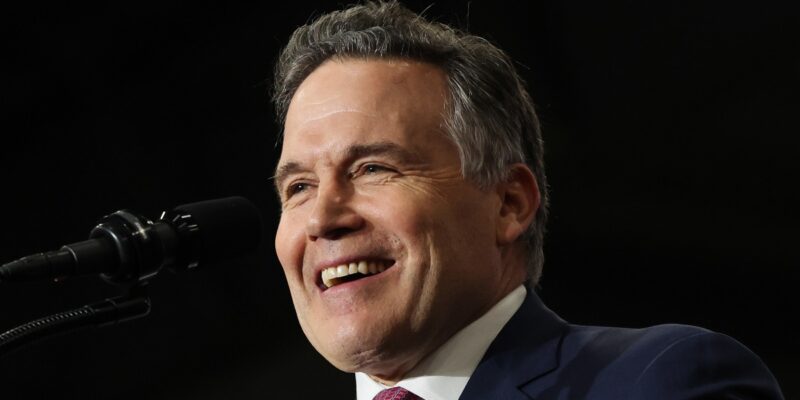
For months, Dave McCormick knew a victory in Pennsylvania’s critical Senate race was far from certain.
Public polling over the summer had him trailing Democratic Sen. Bob Casey, a three-term incumbent and state political scion, by as many as 14 percentage points. McCormick’s own polling, he told NBC News, had him down nearly 10 points, too.
But, said McCormick, Pennsylvania’s senator-elect, he could feel the momentum shifting on the ground, particularly when he campaigned before traditionally Democratic constituencies, including the state’s large Jewish community and Hispanic enclaves in the Lehigh Valley, and with tradesmen in the state.
It was an Italian festival he attended late this summer in Casey’s hometown, Scranton, that stood out most, though. He and his wife started the day by attending a church service.
“Went to the service in the morning, and the entire service is in Italian,” McCormick said, adding: “And then you walk outside into the main square of Scranton, and there’s all these Italian food stands, and it’s full. And a lot of people would come up to me and say: ‘Hey, we got you. We’re with you.’
“And this is Lackawanna County, which is Bob Casey’s literal backyard,” he added. “And I said: ‘Man, I can feel it. I got some energy here.’”
The last time Casey shared a ballot with a presidential candidate was in 2012, when he outran President Barack Obama across Pennsylvania and carried Lackawanna County by 35 points. This year, his margin of victory there shrunk to just 8.4 points. In neighboring Luzerne County, which Casey won by 11 points in 2012, McCormick won by 15 points this year. Those performances in the state’s northeastern corner played a huge role in Casey’s going from a 13-point victory in 2018 to defeat by just more than 15,000 votes last month.
Democrats argue that the win by McCormick, a former hedge fund executive, is more a product of Donald Trump’s strong performance in the state, which boosted Republicans down-ballot. (Notably, the GOP nominees for state attorney general, treasurer and auditor general won more votes than McCormick.) They also point to outsized spending on behalf of McCormick’s bid from three well-funded super PACs, as well as general voter anger with high prices.
“I think if you had to boil it down to one or two words, it’d be ‘costs’ or ‘cost of living,’” Casey, who made fighting “greedflation” a core theme of his campaign, said in an interview. He also described Trump as “about as strong a Republican candidate as they’ve had for president in my lifetime.”
But Republicans say all that is a convenient oversimplification. McCormick seemingly corrected every misstep from Mehmet Oz’s failed GOP Senate campaign in Pennsylvania in 2022 — including effectively neutralizing the carpetbagger narrative Democrats deployed against both Republicans — and vigorously campaigned across the state, as well as gave Republicans an early blueprint of how to handle Vice President Kamala Harris’ taking over the Democratic ticket from President Joe Biden.
McCormick and allies saw other factors that contributed to his win, too, including extensive courting of the state’s Jewish community and investments in reaching the same unreliable voters Trump sought, which were highlighted by advertising during football games. And after internal data showed a substantial number of voters did not have strong opinions about Casey, a three-term incumbent, they hammered away at defining him as ineffective and unable to deliver change.
Now, McCormick, the only GOP candidate for the Senate or governor in the seven presidential battleground states to defeat his Democratic opponent this year, will be one of the most-watched senators entering Washington. NBC News spoke with more than a dozen Republicans and Democrats, many of whom worked on the Senate race, to discuss the makings of his victory and how he is readying to enter the next Congress.
‘The reality was much more favorable for me than it was in the case of Dr. Oz’
No message stuck more in Sen. John Fetterman’s successful 2022 Senate bid than the idea that Oz was not a real Pennsylvanian. Democrats thought they would have good fortune running that playbook back against McCormick, who spent years living in Connecticut and bought his current Pennsylvania home in the run-up to his 2022 Senate bid. (McCormick’s campaign said that that was so his daughter could complete high school there and that his lease ended as of June.)
Yet whereas Fetterman succeeded, Casey fell flat — in no small part because McCormick, a Bloomsburg native, went to great lengths to highlight his long-standing ties to the state. Ironically, ads filmed at the U.S. Military Academy at West Point, New York, were a core part of his message about being a tried-and-true Pennsylvanian, helping him relate to the state’s significant veteran and service member population.
McCormick said, “First of all, the reality was much more favorable for me than it was in the case of Dr. Oz,” whose main tie to Pennsylvania was a brief stint at the University of Pennsylvania. “I grew up in Pennsylvania, which he did not. I played football; I wrestled. I grew up in a small town. I’m a seventh-generation Pennsylvanian.”
McCormick made brandishing his Pennsylvania credentials core to his ad campaign.
“It was much less responding and debating whether I had ever lived in Connecticut, which, of course, I had lived in Connecticut,” McCormick said. “And it was much more going to the pictures and the true narrative.”
He pointed to two ads that he said “represented strategically how we thought about addressing that question,” one highlighting the lessons he learned as a wrestler growing up in Pennsylvania and the other about his time at West Point.
The ads “reinforced the Pennsylvania cred,” McCormick said, adding of the latter ad: “It reinforced that, wait a second, this guy’s a public servant. … He’s been willing to risk his life for his country that ran antithetical to the nasty commercials around, me being somebody who was trying to make money at the expense of others.”
A handful of Pennsylvania Democrats took issue with how the campaign to paint McCormick as a carpetbagger was executed.
“Look, the McCormick team, Dave, they were good,” one said. “Man, they ran a good campaign. And the Connecticut stuff, I think they tried way too hard to make that stick. In this electorate, it just didn’t work.”
Casey’s allies said the Connecticut attacks were an important piece of a broader campaign to diminish McCormick’s standing. A Casey campaign strategist said McCormick’s Connecticut residency “really mattered in all of the polling” the campaign had.
“Was it enough to crumble the roof? No,” this person said. “But I think it was an important part of the campaign. It highlighted his character and trustworthiness. And the idea that it was irrelevant or didn’t matter is ridiculous.”
But McCormick’s Republican allies and advisers described the Connecticut focus as a grave miscalculation, an example of Democrats’ trying to make a playbook that previously worked stick with someone when the facts differed.
“Dr. Oz gave the Democrats a lot to work with in terms of showing that he wasn’t from Pennsylvania,” said a Republican who worked on the race. “And Dave McCormick did not.”
Authoring the Harris playbook
No major Republican campaign was quicker to embrace the change at the top of the Democratic presidential ticket from Biden to Harris than the McCormick team. When Republicans, including Trump, were still working through how to run against Harris, McCormick’s campaign launched a digital ad just two days after the switch that ended up foreshadowing the playbook Republicans ran against her across the map: highlighting her policy statements in 2019.
The ad soon went viral. One reason the McCormick team was so quick on the draw was that in Pennsylvania, they saw Biden, a native son with decades of experience in the state, as a more formidable opponent than Harris, even after his disastrous debate against Trump.
“Pennsylvania was maybe one place Biden would have fared better than Kamala Harris,” McCormick said. “Scranton Joe. 50 years. Campaigning for president six or seven times in Pennsylvania. Knew every county commissioner. A lot of the union guys were in his camp. So I thought he had a formidable Pennsylvania presence.”
Matt Gruda, McCormick’s campaign manager, said the campaign’s initial anti-Harris ad, which connected her past comments with positive things Casey had to say about her, was the most viral moment he has ever been a part of.
“It set the tone. It allowed us to clearly define how we were going to win this race,” he said, adding that the race would have been “definitely different” had Biden remained in the campaign. “I don’t know if it’s better or worse for Casey. We were probably the only campaign in the country that was actually excited about the idea of Kamala Harris being the top of the ticket.”
Casey remained close to Biden after the debate, standing by him and campaigning with him even as other vulnerable Democratic senators stayed at a distance. When Harris took over, Casey was quick to talk up her talents. Seeking to bolster his independent bona fides as Election Day neared, Casey released an ad highlighting areas of agreement with Trump on trade and China. Much earlier in the cycle, he criticized the Biden administration on a handful of fronts, including a pause in natural gas exports and a fight over funding for school archery and hunting programs.
“No, not from Biden,” the Casey campaign strategist said when asked about efforts to distance Casey from the top of the ticket. “Look, we talked about being bipartisan.”
Now, an open question for McCormick’s term is whether he carves out his own path in Trump’s Washington. The previous GOP senator to represent Pennsylvania, Pat Toomey, voted to convict Trump after his second impeachment trial following the Jan. 6 attack on the Capitol. In his first run for the Senate, McCormick lost out on Trump’s endorsement after he refused to say the 2020 election was stolen.
McCormick told NBC News in July that Pennsylvanians “can count on” him to be his “own person” in Congress.
“When I agree with President Trump, which I do on many things, like the border and the economy and China, then I’ll speak loud and clear,” he said. “And if I disagree, I will also be clear about those positions.”
Asked about Trump’s Cabinet picks, including Robert F. Kennedy Jr., Pete Hegseth and Tulsi Gabbard, McCormick said he has “generally” thought Trump’s choices “have been great,” adding that he believes Trump “has a mandate.”
“He was very specific even about a number of the people that he’s nominated, that they were going to play really important, key roles in his administration,” McCormick said. “So he’s, by and large, doing everything he said he would do.
“We in the Senate need to do everything we can to make sure the president has his team as quickly as possible to drive a very extreme agenda, extreme in the best sense of the word, radically good in terms of bringing about the change that’s required,” McCormick continued, adding: “Now, in the Senate, I have a responsibility to advise and consent, and so I’m trying to exercise that. I’m going to meet with every single candidate. I’m going to ask the questions that I think a responsible senator would do.”
Democrats did not express optimism that McCormick will deviate from Trump in any significant way early on. Casey said that question “will be answered” by how McCormick votes on Trump’s Cabinet picks. (A senior aide to a GOP senator said, “I doubt he’s going to try to sink anyone, just because that’d be an audacious move as a freshman.”)
Interestingly, it was Casey’s closeness to the top of his ticket that McCormick’s allies saw as the biggest factor allowing them to drive home their message of change.
“I think this is something that Democratic candidates around the country missed,” a senior McCormick campaign adviser said. “Biden and Harris thought that ‘oh, the border bill is bipartisan. And the infrastructure bill is bipartisan. Oh, and the CHIPS bill is bipartisan.’ In this era, the independent voter is looking for how you disagree with people in your base, not how you agree with the other side.”















